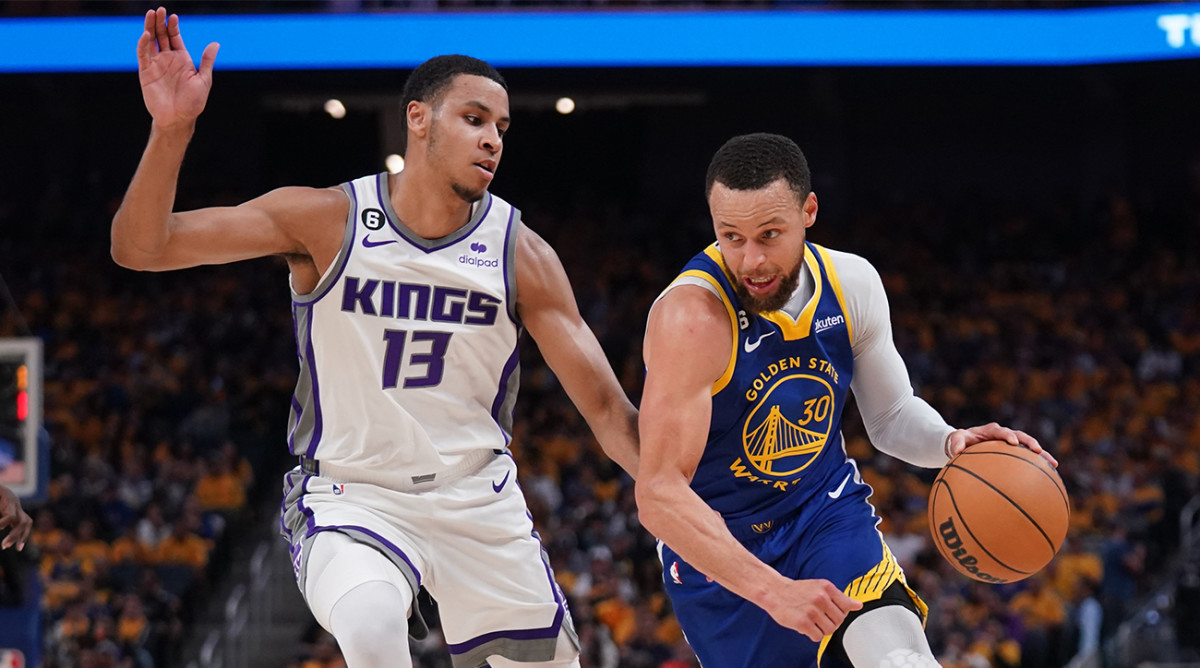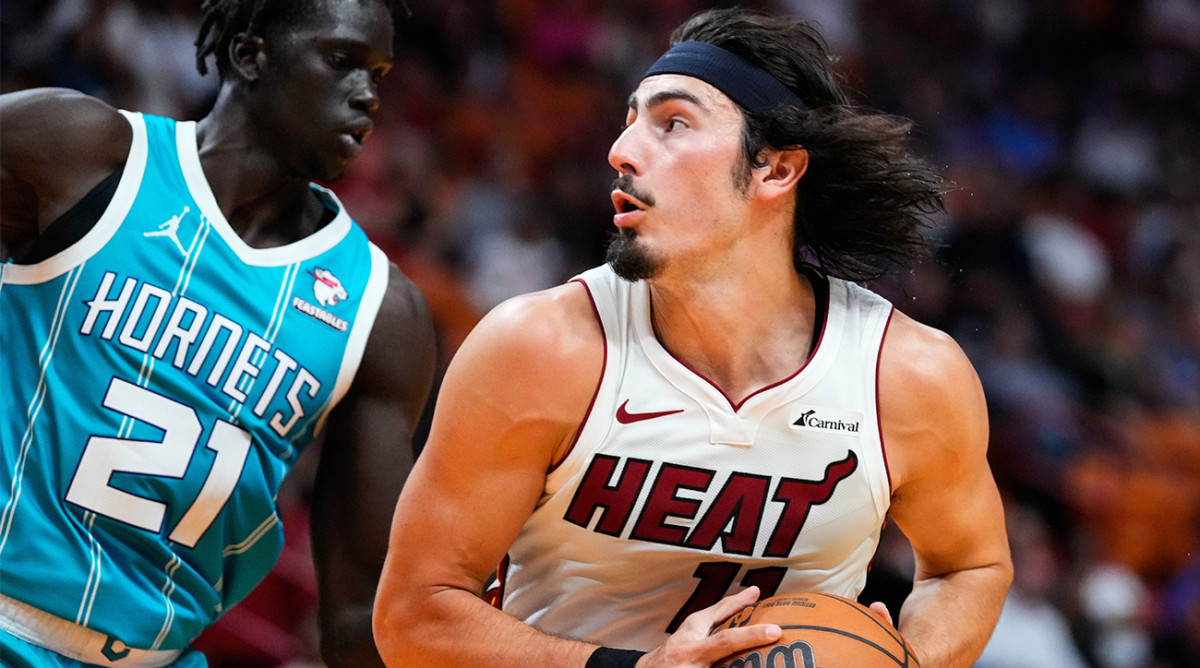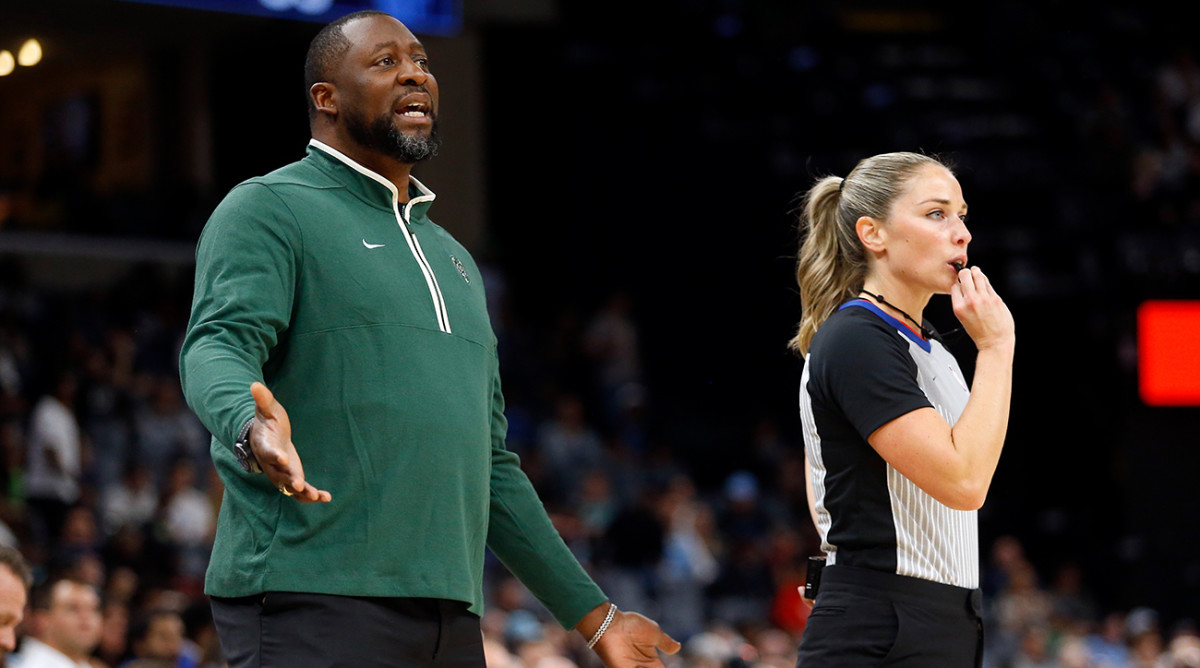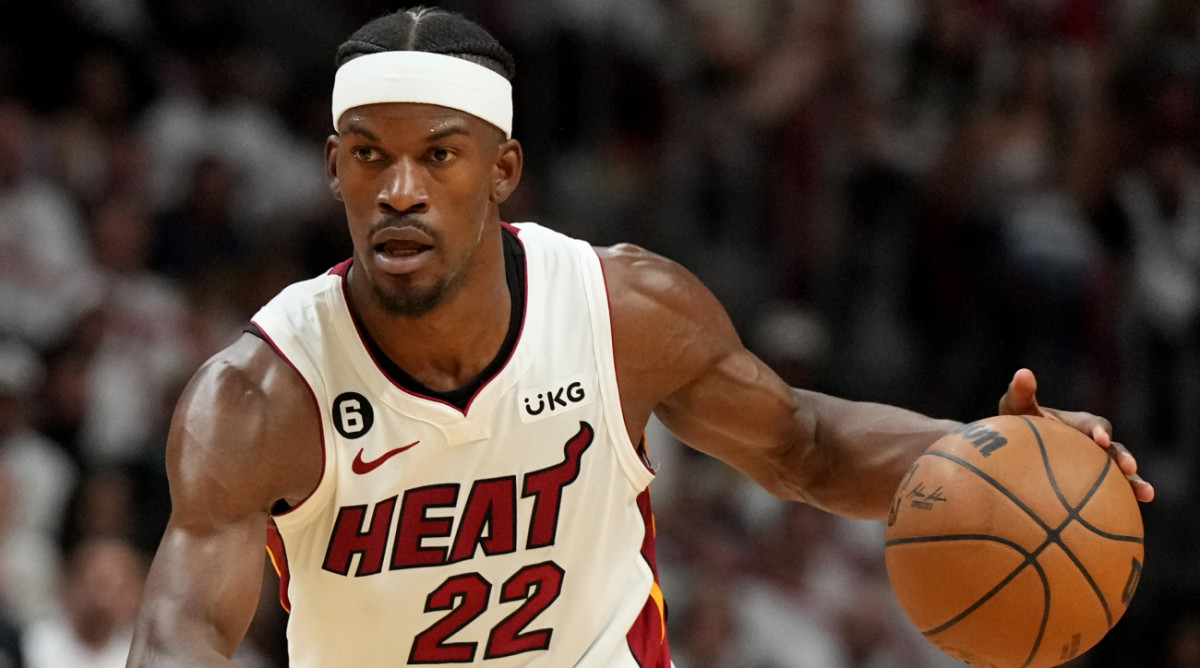What Jimmy Butler Is Looking Forward to This NBA Season
We asked our NBA Preview guest editor, Jimmy Butler, for the hoops story lines he’s most intrigued by for the coming year, and he said the new in-season tournament, which has the potential to give the NBA a decidedly European flair. Butler also shared thoughts on a few other topics, and as all good journalists do when their editor throws out interesting ideas, we covered those as well.
New In-Season Tournament
The variations were spitballed in conference rooms at the NBA’s offices in Manhattan’s Olympic Tower for more than a decade. Ideas that for a variety of reasons—disputes with the union, prioritization of the play-in, a global pandemic that for a while put everything on hold—never made it out of the competition committee. Different formats. Different prizes. Different times of year. A single elimination, 30-team knockout tournament. A tournament that included teams from outside the NBA. A tournament that was stretched over several months, culminating with a knockout round at the end of the season.
“We boiled the ocean on each one of those,” says Evan Wasch, the NBA’s executive vice president of basketball strategy and analytics. “And for a while we were all over the map.”
Last summer, league execs settled on a format they believe in: The NBA In-Season Tournament (they’ll need to work on that name) will be a 30-team, 67-game tourney for the NBA Cup (ditto on this name). The tournament begins with group play (sets of five teams that have been randomly drawn from within conferences) and runs from Nov. 3 to Nov. 28. Some of the matchups are intriguing; one group will culminate with a rematch of last year’s epic Kings-Warriors series, which Golden State iced when Steph Curry dropped 50 in Game 7.

From there eight teams will move on to a knockout round, and the tournament will culminate with a Final Four in Las Vegas on Dec. 7 and Dec. 9. Tournament games will be part of each team’s 82-game regular-season schedule—the championship game, for two teams, will be an 83rd and won’t count in the standings. For players, there will be financial incentives: $500,000 for those on the winning team, $200,000 apiece for the runners-up. Players from the semifinal losers will collect $100,000, with $50,000 each going to quarterfinalists. Overall, the NBA is offering a nearly $18 million pot.
The idea for an in-season tournament was birthed on David Stern’s watch but gained momentum when Adam Silver became commissioner in 2014. Globally, in other sports, in-season tournaments (such as the UEFA Champions League, in which the top soccer teams in Europe compete, and the various soccer domestic cups, in which teams from all levels compete in a one-and-done format) are fixtures on the calendar. Successful ones. In meetings, league officials have pushed a future in which the In-Season Tournament might gain the status of a Wimbledon or an FA Cup. Win four majors in tennis, it’s a Grand Slam. Win your soccer league title, the Champions League and your domestic cup and it’s The Treble. Win the Finals and the In-Season Tournament, it’s The Double.
“We think, and taking nothing away whatsoever from the Larry O’Brien Trophy and the ultimate goal of winning a championship, that you can create another competition within the season that becomes meaningful,” Silver said.
And profitable. Make no mistake, the league’s motives here are purely financial. The NBA’s broadcast rights deals expire after next season, and an in-season tournament is a shiny new toy to dangle in front of would-be buyers. “If you just say, ‘We’re going to stick with our 82-game season and our playoffs,’ that’s sort of a fixed pie,” says Wasch. As a tentpole event, the league can sell an in-season tournament to a network (or streaming service) as a standalone, potentially raking in hundreds of millions more in revenue.
Generating early-season interest is a benefit, too. The NBA’s six-month regular season is long. Games in the first couple of months, battling for attention with the NFL, often struggle to gain traction. Many fans don’t fully engage with the league until Christmas. Meanwhile, load management—a phrase the NBA would like to see vaporized from its lexicon, recently announcing new penalties in an attempt to prevent teams from sitting multiple stars at the same time—has diluted the product. The In-Season Tournament, theoretically, creates meaningful games in November. Tuesdays and Fridays are designated “Tournament Nights” for group-play games, and officials believe a splashy Final Four in Vegas—in which teams will wear tournament-specific uniforms and play in specially designed courts—will draw eyeballs.
Will players see the tournament as meaningful? “As the saying goes, new traditions aren’t created overnight,” said Silver. “This will need to build over time.” American-born players conditioned to believe only one championship matters won’t eagerly embrace a chase for another. But foreign-born players make up nearly a third of NBA rosters, and many grew up with in-season tournaments. And the league believes that as the tournament progresses, a natural competitiveness will kick in. “If we get to the end,” says Suns coach Frank Vogel, “we’re going to pour everything we can into winning that championship.” Wasch says he spoke to an NBA owner recently who relayed a message from his star player: “If there is a cup to lift at the end of a competition, I’m in.”
The league is prepared for pushback. An eye roll from LeBron James. A smirk from Curry. The tournament, though, isn’t really for James, Curry or other veterans whose trophy rooms may already be stuffed. It’s for the next generation of stars, teenagers such as Cooper Flagg and Dylan Harper. The league hopes they’ll be excited about the idea of capturing an in-season title and hoisting some hardware.
“There is no intrinsic value to this Cup,” says Wasch. “It doesn’t have the history of the Larry; it doesn’t have that prestige. Players won’t immediately view their résumés as being bolstered by an NBA Cup. We’re not even hoping that in the long term this rivals or surpasses or equals the Larry O’Brien in terms of importance and prestige to players and teams. We don’t want that. The Larry O’Brien should be the top of the pyramid in the NBA ecosystem. But we believe we can create something that comes close, that when players and teams look at the season each year and plan out their goals, their strategies for the year, they see Larry O’Brien as the 1A, and in-season tournament as the 1B.”
There will be more tinkering to the format. The NBA will track changes in attendance and television ratings. While harder to quantify, they will also look for a different energy on the floor. Rewards like automatic playoff berths, draft picks and cap exceptions have been discussed, and they could be revisited. “I’m sure we’ll learn a lot once it starts,” said Silver. For the NBA, the play-in tournament among the seventh- to 10th-seeded teams that began in 2021 has been a wildly successful innovation, driving competitive games at the end of the season. In time, an in-season tournament may bring new energy to its early days. —Chris Mannix
Rookie to Watch
Jaime Jaquez Jr., Miami Heat
As far back as September 2022, when he was a senior at UCLA, forward Jaime Jaquez Jr. was telling reporters his favorite player in the NBA was none other than Jimmy Butler. In the lead-up to this year’s draft in June, Jaquez further stated that Butler was his favorite player both on and off the court. As luck would have it, Jaquez was drafted by the team that employs Butler, and the two have already struck up a friendship, filming a Hotels.com commercial together in Beverly Hills in early September.
The Heat’s selection of Jaquez with the 18th pick could be a sign of an evolution in NBA draft philosophy, at least among teams that are ready to contend. The draft has typically been about finding the players with the highest upside possible, an approach that favors one-and-done prospects rather than players who stayed in college for three or four years. But the strict new collective bargaining agreement, which limits free-agent opportunities for teams that are over the cap, means contenders will now look to the draft for more mature talents who can contribute right away. The Nuggets made this strategy pay off last season, when 2022 first-rounder Christian Braun, who spent three years at Kansas, delivered off the bench in the NBA Finals.

For Miami, Jaquez may end up being its most important offseason addition. At 6' 7" and 225 pounds, he has the size to compete on the wing in the NBA, and he improved his scoring average every season as a Bruin. While not a great shooter, Jaquez, 22, was a creative scorer in college, and he will have to continue to be, playing off one of the top shot creators in the league. In Butler, he will have a willing mentor as he finds his role on a team with championship aspirations. —Rohan Nadkarni
Best Coach (non—Erik Spoelstra division)
Adrian Griffin, Milwaukee Bucks
At his introductory press conference, Adrian Griffin described his coaching style as the sum of his experiences: part Scott Skiles, who gave him his first assistant coaching job in Milwaukee in 2008; part Tom Thibodeau, with whom Griffin spent five years in Chicago; part Billy Donovan, who hired Griffin in Oklahoma City; part Nick Nurse, with whom Griffin won a championship in Toronto—while also completing a Ph.D. in organizational leadership. “I had great mentors,” said Griffin. “I’m extremely appreciative of the path I’ve taken.”
That path has now led Griffin back to Milwaukee, where he takes on one of the NBA’s best head-coaching jobs—and also the one with the most pressure. With a trio of All-Stars (Giannis Antetokounmpo, Khris Middleton, Damian Lillard) and a deep bench, the Bucks expect to contend for a title. And they better; in interviews Antetokounmpo, a free agent in 2025, has been clear that if Milwaukee isn’t positioned to win championships, he’ll move on to an organization that is. Remember, this is a team that fired Mike Budenholzer in May after a first-round playoff exit despite his having led the team to a title in ’21.

Griffin, 49, played for five teams in nine NBA seasons, with stops in the CBA and USBL along the way. His broad experience, and his ability to take something from each stop, appealed to the Bucks’ brass. In interviews, Griffin dazzled team officials with his attention to detail. “Winning in the playoffs is a game of inches,” said Milwaukee GM Jon Horst. “It’s about doing the little things better.”
After the Bucks’ 58-win season, Griffin isn’t looking to make radical changes. “We have special talent,” he said, adding that he wasn’t going to “uproot everything.” He wants the Bucks to be proactive on defense. “Pressure the ball,” Griffin said. He wants the Bucks to be aggressive on the offensive glass. And he believes that Antetokounmpo, like the other stars Griffin has worked with, is eager to be coached. “He’s made it clear he’s open and on board,” Griffin said. “It’s going to be fun.” —Chris Mannix
Surprise MVP Candidate
Butler’s answer, when asked the name of an under-the-radar MVP candidate for this season, was interesting: Not Jimmy Butler. He didn’t elaborate much, which raised a couple of questions: Was he joking? Or was he acknowledging the reality of voters’ preferences?
Really, though, is it so outlandish to think Butler might throw himself into the race for the Michael Jordan Trophy? Well, look at the data, and the answer is clear: Yes, it is outlandish.
In his 12-year career, Butler has been a six-time All-Star and was the Eastern Conference finals MVP last year, but he has received MVP votes after only three seasons: 2018 (one third-place vote, tied for 10th overall), ’20 (two third-place votes, three fifth-place votes, 11th overall) and last year (three fifth-place votes, 10th overall).

That comes out to 0.017 MVP award shares (a percentage of voting points earned relative to the number possible). Among players who have the same or higher career MVP shares are (with all due respect) Jim Chones, who never made an All-Star team in his 10-year career; old-time center Walter Dukes, whose career-best season saw him average 15.2 points per game on 36.1% shooting; Kenny “Big Cat” Sears, a two-time All-Star best remembered now as the first basketball player to appear on the cover of this magazine.
Of course, Butler has the misfortune of playing in an era teeming with superstars. He’s not a triple-double machine. He’s a decent-at-best three-point shooter. He’s played more than 70 games just twice in 12 seasons. And it doesn’t help that MVP voting takes place before the postseason, so his playoff heroics aren’t a factor.
So Butler is probably right. Our guest editor won’t win an MVP award any time soon. A National Magazine Award, on the other hand . . . —Mark Bechtel
